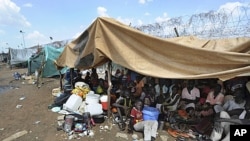The United States warned Sudan Tuesday it will not move ahead on normalizing relations with Khartoum if it pursues a military solution to its disputes with the south over the Abyei and Southern Kordofan regions. U.S. officials say violence in the two areas complicates efforts to resolve other issues in advance of South Sudan’s independence July 9.
The U.S. warning to Khartoum was the most explicit to date, and it followed meetings in Addis Ababa Monday between Secretary of State Hillary Clinton and senior officials of both north and south Sudan.
Southern Sudan is due to become an independent country July 9, capping the north-south peace process charted by the parties’ 2005 Comprehensive Peace Accord, the CPA, that ended decades of civil conflict.
The south voted for independence in January and the sides have been able to resolve a number of key issues on a peaceful separation. However, differences over the status of the oil-rich border regions of Abiyeh and Southern Kordofan have flared into violence in recent weeks.
The Khartoum government seized most of Abyei several weeks ago and its bombing campaign against southern-aligned fighters in Southern Kordofan in recent days has dislodged tens of thousands of civilians.
The United States, which has noty had full relations with Sudan since 1998, has offered an explicit “roadmap” of normalization steps as an incentive for Khartoum to fully implement the CPA.
State Department Deputy Spokesman Mark Toner Tuesday deplored what he said was a “rapid and significant” deterioration of security conditions in Southern Kordofan, including a troop buildup and intensified bombing campaign by northern forces that he said puts the roadmap at risk.
“The United States condemns any escalation of the current crisis," he said. "If Sudan chooses to escalate further this situation, and pursue a military solution to the future status of Abyei and Southern Kordofan, the United States will not move forward on the roadmap to normalization of relations, and Sudan will face deeper international isolation.”
Secretary Clinton met South Sudan's president Salva Kiir and Khartoum presidential adviser Nafie Ali Nafie in the Ethiopian capital Monday to press for security arrangements, including deployment of Ethiopian peacekeepers under a United Nations mandate in Abyei.
A senior U.S. official traveling with the Secretary of State from Addis Ababa said the trouble in the two regions will not prevent southern independence, but does “cast a pall” over separation arrangements.
He said consequences for the Khartoum government would be “very grave” if it pursued a military solution in the disputed regions, including the loss of anticipated debt-relief and access to World Bank support.
The State Department's Toner said he expects U.S. envoy for Sudan Princeton Lyman, who accompanied Clinton home from Africa, to return to the region shortly for urgent Sudan diplomacy.
US Warns Sudan on Abyei, Southern Kordofan














